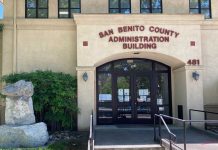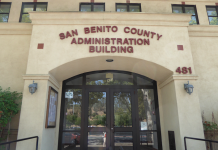The Hollister City Council will consider placing measures on the
November ballot to raise two taxes and create two others.
City Manager Dale Shaddox will propose increases to the citywide
business license tax and the transient occupancy tax (TOT)
– a charge levied for use of motels and hotels in Hollister. The
new levies under consideration include
”
utility users
”
and
”
public safety
”
taxes.
The Hollister City Council will consider placing measures on the November ballot to raise two taxes and create two others.
City Manager Dale Shaddox will propose increases to the citywide business license tax and the transient occupancy tax (TOT) – a charge levied for use of motels and hotels in Hollister. The new levies under consideration include “utility users” and “public safety” taxes.
Shaddox plans to pitch the potential measures to Council members at a special meeting Jan. 12, he said Monday. The extent of such an escalation has yet to be determined, Shaddox said.
Other ideas for new dues could be discussed as well, he said, including a tax to help fund street maintenance and another for recreation services.
If approved by the Council, all four proposed changes would still require voter approval on an election ballot. The City Clerk’s Office is researching whether state election laws mandate 50-percent approval or more, Shaddox said.
Meanwhile, Council members acknowledged tax hikes are usually an unpopular notion.
“I’m very supportive of giving the community their opportunity to be heard,” Mayor Tony Bruscia said, though he expressed hesitancy to personally support additional taxes in saying, “I think we pay too much in taxes as a society.”
The possibility for tax increases comes while the city has been challenged by local and state budget shortfalls. Hollister has functioned in deficit four consecutive years and is facing another shortage of more than $2 million in the 2004-05 fiscal year.
For 2003-04, city officials budgeted to collect more than $6 million from an array of taxes, according to Finance Director Barbara Mulholland. They also projected to receive $1 million from various fees, such as those for cable television and garbage collection services.
It’s not nearly enough, though.
“Hollister suffers from low revenues for the existing revenue sources,” Shaddox said.
He pointed out the tax charged to occupants of motels and hotels in Hollister is particular low at 8 percent – compared to 12 percent in most jurisdictions. Shaddox wants to bump the local TOT to 12 percent, too.
Though Hollister, he acknowledged, doesn’t have many lodging establishments anyhow, which he said he wants to change by recruiting more here once the building moratorium is over. The city expects to make about $120,000 in TOT revenue this year, Shaddox said.
Of the proposals, Bruscia said the TOT increase makes the most sense because non-residents primarily foot the bill.
Councilman Tony LoBue won’t support any tax hikes, he said, except for the benefit of public safety.
“I believe the people are truly aware that the amount of public safety we have now,” LoBue said, “should be at a higher level.”
The tax ideas are part of a broader five-year financial trend analysis Shaddox and other officials are putting together.
The city also recently hired a consultant to study more than 20 impact and user fees, which officials believe are outdated and low – compared to other cities – across the board. When the study is finished, around April, officials plan to update the fees. Shaddox expects new rates by July 1.
“Our fees and charges for services and our development impact fees,” Shaddox said, “are substantially lower than other jurisdictions and substantially lower than what they should be.”









